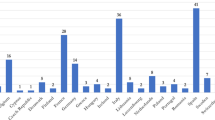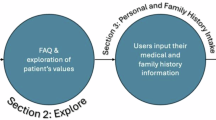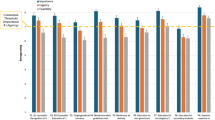Abstract
The paper focuses on the fundamental debate that is going on in Europe and the United States about whether genes and genetic diagnostic methods are to be regarded as inventions or subject matter eligible for patent protection, or whether they are discoveries or principles of nature and thus excluded from patentability. The study further explores some possible scenarios of American influences on European patent applications with respect to genetic diagnostic methods. Our analysis points out that patent eligibility for genes and genetic diagnostic methods, as discussed in the United States in the Association of Molecular Pathology versus US Patent and Trademark Office decision, is based on a different reasoning compared with the European Patent Convention.
Similar content being viewed by others
Log in or create a free account to read this content
Gain free access to this article, as well as selected content from this journal and more on nature.com
or
References
Association of Molecular Pathology v. U.S. Patent and Trademark Office: USDC SDNY 09 Civ. 4515, 29 March 2010.
Kesselheim AS, Mello MM : Gene patenting – is the pendulum swinging back? N Engl J Med 2010; 362: 1855–1858.
Matthijs G : The European opposition against the BRCA gene patents. Fam Cancer 2006; 5: 95–102.
Matthijs G, Halley D : European-wide opposition against the breast cancer gene patents. Eur J Hum Genet 2002; 10: 783–785.
Chandrasekharan S, Cook-Deegan R : Gene patents and personalized medicine – what lies ahead? Genome Med 2009; 1: 92.
Wu G : Patenting biotech beyond the central dogma. Nat Biotechnol 2010; 28: 230–233.
Biogen Inc. v. Medeva Plc. Hepatitis-B-virus, 1997: R.P.C. 1 (41–42).
Red Dove (Rote Taube), X ZB 15/67: Federal Supreme Court, 1969. 1 I.I.C. 136, 1970.
Explanatory Memorandum (Memorie van Toelichting): Parliamentary Documents (Parlementaire Stukken), Kamer, 50 K1886, Article 5, Belgium, 2001–2002.
Diamond v. Chakrabarty. 447 US 303 (1980).
In re Bilski. 545 F.3d at 961-2 (Fed. Cir. 2008).
Bilski v. Kappos. U.S., No. 08-964 (6/28/10).
Prometheus Laboratories, Inc. V. Mayo Collaborative Services: No. 2008-1403 (Fed. Cir. 2009).
Directive 98/44/EC of the European Parliament and of the Council of 6 July 1998 on the legal protection of biotechnological inventions: Official Journal L 213, 30/07/1998 P. 0013–0021. The Directive was incorporated in the EPC in 1999. The wording of Rule 29 (2) is identical to the wording of Article 5 (2) of the Directive.
Matthijs G, Ayme S (guest eds).: Patenting and licensing in genetic testing. Eur J Hum Genet 2008; 16 (Suppl 1): S1–S50.
American College of Medical Genetics: Position Statement on Gene Patents and Accessibility of Gene Testing (1999), as reconfirmed in 2005 http://genetics.faseb.org/genetics/acmg/pol-34.htm.
Appeal from the United States District Court for the Southern District of New York, in case no. 09-CV-4515: Senior Judge Robert W. Sweet. Brief for the United States as amicus curiae in support of neither party (No. 2010-1406).
G1/04, http://www.epo.org/law-practice/case-law-appeals/pdf/g040001ex1.pdf, 2005.
In re Grams. 888 F.2d at 837 (Fed. Circ. 1989).
Monsanto v. Cefetra: (ECJ C-428/08).
Rimmer M : Intellectual Property Rights and Biotechnology. Northhampton: Edward Elgar Publishing Limited, 2007.
Huys I, Berthels N, Matthijs G, Van Overwalle G : Legal uncertainty in the area of genetic diagnostic testing. Nat Biotechnol 2009; 27: 903–909.
G3/08, http://www.epo.org/law-practice/case-law-appeals/pdf/g080003ex1.pdf.
Eli Lilly v Human Genome: EWCA Civ 33, 2010.
Trilateral Offices Website http://www.trilateral.net/index.html;jsessionid=1eoqe443ybb8s.
Author information
Authors and Affiliations
Corresponding author
Ethics declarations
Competing interests
The authors declare no conflict of interest.
Author's background
IH is assistant professor of patent law at the Faculty of Pharmaceutical Sciences, University of Leuven (Belgium) and associated with the Centre for Intellectual Property Rights, Faculty of Law, University of Leuven (Belgium). She has a Masters in Intellectual Property Rights (LLM) from the Max-Planck-Institute for Intellectual Property Rights, Tax and Competition Law in Munich. GVO is professor of IP law at the Centre for Intellectual Property Rights, Faculty of Law, University of Leuven (Belgium) and professor of patent law and new technologies at the Tilburg Institute for Law, Technology and Society (the Netherlands). GM is professor of human genetics and head of the Laboratory for Molecular Diagnostics, Centre for Human Genetics, Faculty of Biomedical Sciences, University of Leuven (Belgium).
Additional information
Supplementary Information accompanies the paper on European Journal of Human Genetics website
Supplementary information
Rights and permissions
About this article
Cite this article
Huys, I., Van Overwalle, G. & Matthijs, G. Gene and genetic diagnostic method patent claims: a comparison under current European and US patent law. Eur J Hum Genet 19, 1104–1107 (2011). https://doi.org/10.1038/ejhg.2011.76
Received:
Revised:
Accepted:
Published:
Issue date:
DOI: https://doi.org/10.1038/ejhg.2011.76
Keywords
This article is cited by
-
Continental drift? Do European clinical genetic testing laboratories have a patent problem?
European Journal of Human Genetics (2019)
-
D’Arcy v. Myriad Genetics: A Demand for the “Made” or “Non-Information” and Clear Subject Matter?
IIC - International Review of Intellectual Property and Competition Law (2016)
-
The European BRCA patent oppositions and appeals: coloring inside the lines
Nature Biotechnology (2013)
-
Gene patents in the US - focusing on what really matters
Genome Biology (2012)



